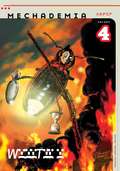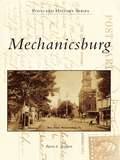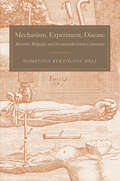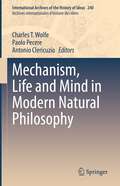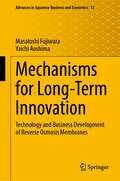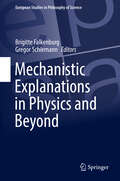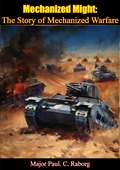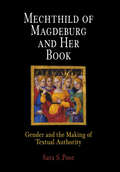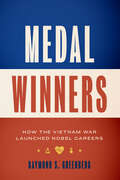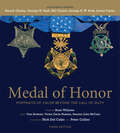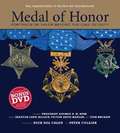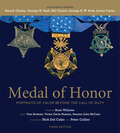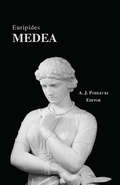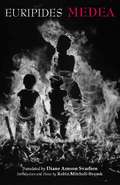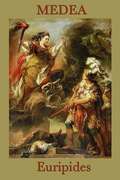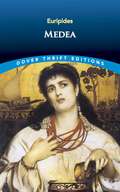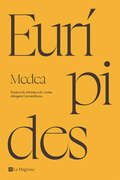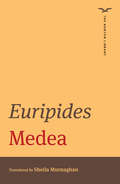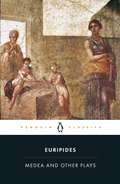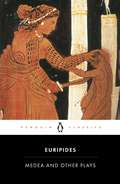- Table View
- List View
Mechademia 4: War/Time (Mechademia #4)
by Frenchy LunningThe themes of war and time are intertwined in unique ways in Japanese culture, freighted as that nation is with the multiple legacies of World War II: the country&’s militarization, its victories and defeats, Hiroshima and Nagasaki, and the uneasy pacifism imposed by the victors. Delving into topics ranging from the production of wartime propaganda to the multimedia adaptations of romance narrative, contributors to the fourth volume in the Mechademia series address the political, cultural, and technological continuum between war and the everyday time of orderly social productivity that is reflected, confronted, and changed in manga, anime, and other forms of Japanese popular culture.Grouped thematically, the essays in this volume explore the relationship between national sovereignty and war (from the militarization of children as critically exposed in Grave of the Fireflies to reworkings of Japanese patriotism in The Place Promised in Our Early Days), the intersection of war and the technologies of social control (as observed in the films of Oshii Mamoru and the apocalyptic vision of Neon Genesis Evangelion), history and memory (as in manga artists working through the trauma of Japan&’s defeat in World War II and the new modalities of storytelling represented by Final Fantasy X), and the renewal and hybridization of militaristic genres as a means of subverting conventions (in Yamada Futaro&’s ninja fiction and Miuchi Suzue&’s girl knight manga).Contributors: Brent Allison; Mark Anderson; Christopher Bolton, Williams College; Martha Cornog; Marc Driscoll, U of North Carolina, Chapel Hill; Angela Drummond-Mathews, Paul Quinn College; Michael Fisch; Michael Dylan Foster, Indiana U; Wendy Goldberg; Marc Hairston, U of Texas, Dallas; Charles Shiro Inouye, Tufts University; Rei Okamoto Inouye, Northeastern U; Paul Jackson; Seth Jacobowitz, San Francisco State U; Thomas Lamarre, McGill U; Tom Looser, New York U; Sheng-mei Ma, Michigan State U; Christine Marran, U of Minnesota; Zilia Papp, Hosei U, Tokyo; Marco Pellitteri; Timothy Perper; Yoji Sakate; Chinami Sango; Deborah Scally; Deborah Shamoon, U of Notre Dame; Manami Shima; Rebecca Suter, U of Sydney; Takayuki Tatsumi, Keio U, Tokyo; Christophe Thouny; Gavin Walker; Dennis Washburn, Dartmouth College; Teresa M. Winge, Indiana U.
Mechademia 8: Tezuka’s Manga Life (Mechademia)
by Frenchy LunningKnown as the &“Walt Disney of Japan&” it is no surprise that Tezuka Osamu is still the best-known manga creator to Western fans. Current scholarship has uncovered the profound complexity and ambiguity not only of his work but of the man, the artist, and his life—dismantling his position as the god of manga.Contributors to this volume of Mechademia—a series devoted to creative and critical work on anime, manga, and the fan arts—analyze Tezuka and his complicated approaches toward life and nonlife on earth, as well as his effect on the lives of other manga artists. Using essays and reprints of Japanese manga on Tezuka, this book questions his influence and attitudes toward the nonhuman, evolutionary theory, the aesthetic lineage of contemporary manga, incipient feminism in the reinscription of the nonhuman feminine, the sexual politics of manga bodies, the origins of the moe culture, and the styles of didacticism revealing the digressions of insects and classical modes, among others.The authors offer varying perspectives on the historical transformations in production, distribution, and reception that gradually integrated and differentiated an overlapping series of markets and readerships in the postwar era. Divided into four sections that explore different &“lives&”—&“Nonhuman Life,&” &“Media Life,&” &“A Life in Manga,&” and &“Everyday Life&”—Mechademia 8 serves as a prehistory of the impersonal politics of the present while tracing Tezuka&’s legacy. Contributors: Akatsuka Fujio; Anno Moyoko; Linda H. Chance, U of Pennsylvania; Jonathan Clements; Hideaki Fujiki, Nagoya U; Patrick W. Galbraith; Verina Gfader, U of Huddersfield; Alicia Gibson; G. Clinton Godart, USC; Yorimitsu Hashimoto, Osaka U; Ryan Holmberg; Hikari Hori, Columbia U; Mary A. Knighton, College of William and Mary; Thomas Lamarre, McGill U; Christine L. Marran, U of Minnesota; Natsume Fusanosuke, Gakushuin U, Tokyo; Ōtsuka Eiji, Kobe Design U; Baryon Tensor Posadas; Renato Rivera Rusca, Meiji U; Frederik L. Schodt; Marc Steinberg, Concordia U; Tezuka Osamu; Toshiya Ueno, Wako U, Tokyo; Matthew Young.
Mechanical Analysis of China's Macro Economic Structure: Fundamentals Behind Its Macro Investment Strategy Formulation
by Xiaojiang ZhangThis volume is a major breakthrough in helping decipher and piece together the major interactive and flow investment dynamics within the complex Chinese economic structure, in an effort to guide global investors to formulate their own macro assessment and investment strategy in or related to China. Different from US that had a relatively short and ascending economic past, China endured a much longer history with quite a few volatile economic cycles. With that lesson of history in the background as the country’s guiding management principle, China’s economic policy and management superstructure, combined with regional government, business, consumer and investment community, form together a huge and complex operating environment of investment flow dynamics within which macro investment opportunities can be identified and strategies can be formulated by interested global and domestic investors..
Mechanicsburg
by Byron L. ReppertMechanicsburg, nestled in Cumberland County midway between Harrisburg, the state capital, and Carlisle, the county seat, was once known as Drytown, Pinchgut, and Stauffertown. Incorporated in 1828 and named for a settlement of mechanics that repaired Conestoga wagons, Mechanicsburg was raided by the Confederates and held for three days during the Civil War. Both the Cumberland Valley Railroad and the development of the inland Naval Support Activity Base influenced the rapid growth of this borough. Since 1924, Mechanicsburg has played host to Jubilee Day, Pennsylvania's largest one-day street fair.
Mechanism, Experiment, Disease: Marcello Malpighi and Seventeenth-Century Anatomy
by Domenico Bertoloni MeliA leading early modern anatomist and physician, Marcello Malpighi often compared himself to that period’s other great mind—Galileo. Domenico Bertoloni Meli here explores Malpighi’s work and places it in the context of seventeenth-century intellectual life.Malpighi’s interests were wide and varied. As a professor at the University of Bologna, he confirmed William Harvey’s theory of the circulation of blood; published groundbreaking studies of human organs; made important discoveries about the anatomy of silkworms; and examined the properties of plants. He sought to apply his findings to medical practice. By analyzing Malpighi’s work, the author provides novel perspectives not only on the history of anatomy but also on the histories of science, philosophy, and medicine. Through the lens of Malpighi and his work, Bertoloni Meli investigates a range of important themes, from sense perception to the meaning of Galenism in the seventeenth century. Bertoloni Meli contends that to study science and medicine in the seventeenth century one needs to understand how scholars and ideas crossed disciplinary boundaries. He examines Malpighi’s work within this context, describing how anatomical knowledge was achieved and transmitted and how those processes interacted with the experimental and mechanical philosophies, natural history, and medical practice. Malpighi was central in all of these developments, and his work helped redefine the intellectual horizon of the time. Bertoloni Meli’s critical study of this key figure and the works of his contemporaries—including Borelli, Swammerdam, Redi, and Ruysch—opens a wonderful window onto the scientific and medical worlds of the seventeenth century.
Mechanism, Life and Mind in Modern Natural Philosophy (International Archives of the History of Ideas Archives internationales d'histoire des idées #240)
by Charles T. Wolfe Paolo Pecere Antonio ClericuzioThis volume emphasizes the diversity and fruitfulness of early modern mechanism as a program, as a concept, as a model. Mechanistic study of the living body but also of the mind and mental processes are examined in careful historical focus, dealing with figures ranging from the first-rank (Bacon, Descartes, Spinoza, Cudworth, Gassendi, Locke, Leibniz, Kant) to less well-known individuals (Scaliger, Martini) or prominent natural philosophers who have been neglected in recent years (Willis, Steno, etc.). The volume moves from early modern medicine and physiology to late Enlightenment and even early 19th-century psychology, always maintaining a conceptual focus. It is a contribution to a newly active field in the history and philosophy of early modern life science. It is of interest to scholars studying the history of medicine and the development of mechanistic theories.
Mechanisms for Long-Term Innovation: Technology and Business Development of Reverse Osmosis Membranes (Advances in Japanese Business and Economics #31)
by Yaichi Aoshima Masatoshi FujiwaraThis book explores how a long-term innovation can take place based on historical analyses of the development of reverse osmosis (RO) membrane from the early 1950s to the mid-2010s. The RO membrane is a critical material for desalination that is a key to solve water shortages becoming serious in many places of the world. The authors conducted in-depth field studies as well as analyses of rich archival data to demonstrate how researchers, engineers, managers, entrepreneurs, and policymakers interacted each other for this material innovation to be realized. A series of historical analyses in this book uncovered that initial government supports, strategic niche markets, emergence of breakthrough technology, and company-specific rationales played significant roles for companies to overcome four types of uncertainty, technological, market, competition, and social/organizational ones, and enabled the companies to persistently invest in the development and commercialization of the RO membrane. This book depicts that innovation does not arise on a sudden, but that it is actualized through long lasting process with turns and twists, which is driven by many non-economic rationales beyond economic motives.
Mechanistic Explanations in Physics and Beyond (European Studies in Philosophy of Science #11)
by Brigitte Falkenburg Gregor SchiemannThis volume offers a broad, philosophical discussion on mechanical explanations. Coverage ranges from historical approaches and general questions to physics and higher-level sciences . The contributors also consider the topics of complexity, emergence, and reduction. Mechanistic explanations detail how certain properties of a whole stem from the causal activities of its parts. This kind of explanation is in particular employed in explanatory models of the behavior of complex systems. Often used in biology and neuroscience, mechanistic explanation models have been often overlooked in the philosophy of physics. The authors correct this surprising neglect. They trace these models back to their origins in physics. The papers present a comprehensive historical, methodological, and problem-oriented investigation. The contributors also investigate the conditions for using models of mechanistic explanations in physics. The last papers make the bridge from physics to economics, the theory of complex systems and computer science . This book will appeal to graduate students and researchers with an interest in the philosophy of science, scientific explanation, complex systems, models of explanation in physics higher level sciences, and causal mechanisms in science.
Mechanized Might: The Story of Mechanized Warfare
by Lt.-Gen. Robert Lee Bullard Major Paul. C. RaborgOriginally published in 1942, this book gave the first popular account of mechanized warfare—a subject on which its author, Major Paul C. Raborg, was a thorough master.Raborg describes the unchanging character of military strategy and the mechanized armies of today, gives a detailed and complete picture of America’s new armies now in the field, and illustrates high-power blitzkrieg tactics with an analysis of the Battle of France where operations of the Nazis proceeded “according to plan.”“The entire future of our world depends on the mechanized might which is produced by the United States. Although no victory in this new war of speed can be accomplished without superiority in the air, and although naval strength figures prominently in this most terrible of all conflicts, the Second World War, no victories can be decisive, complete, or final without the most efficient mechanized and motorized land armies.[…]“The descriptions set forth herein are vitally necessary so that every citizen of the United States and of all the democracies may fully realize the mechanized might of our present new armies and the overpowering mechanized might that is planned for the future and thereby know that, regardless of reverses, eventual victory is certain.”“Mechanized Might is written in a style easy for the general public to understand. The book has tremendously intrigued and interested me, for I, like its author, took active part in the First World War and have since watched with unflagging interest all developments, especially in regard to the smashing style of German warfare that has wrecked Europe. I cannot see how this book can fail to interest everybody, especially as we are in a war of frightfulness up to now unequaled in history.[...]”—Lt.-Gen. Robert Lee Bullard, Introduction, Mechanized Might
Mechthild of Magdeburg and Her Book
by Sara S. PoorSometime around 1230, a young woman left her family and traveled to the German city of Magdeburg to devote herself to worship and religious contemplation. Rather than living in a community of holy women, she chose isolation, claiming that this life would bring her closer to God. Even in her lifetime, Mechthild of Magdeburg gained some renown for her extraordinary book of mystical revelations, The Flowing Light of the Godhead, the first such work in the German vernacular. Yet her writings dropped into obscurity after her death, many assume because of her gender.In Mechthild of Magdeburg and Her Book, Sara S. Poor seeks to explain this fate by considering Mechthild's own view of female authorship, the significance of her choice to write in the vernacular, and the continued, if submerged, presence of her writings in a variety of contexts from the thirteenth through the nineteenth century. Rather than explaining Mechthild's absence from literary canons, Poor's close examination of medieval and early modern religious literature and of contemporary scholarly writing reveals her subject's shifting importance in a number of differently defined traditions, high and low, Latin and vernacular, male- and female-centered.While gender is often a significant factor in this history, Poor demonstrates that it is rarely the only one. Her book thus corrects late twentieth-century arguments about women writers and canon reform that often rest on inadequate notions of exclusion. Mechthild of Magdeburg and Her Book offers new insights into medieval vernacular mysticism, late medieval women's roles in the production of culture, and the construction of modern literary traditions.
Medal Winners: How the Vietnam War Launched Nobel Careers
by Raymond S. GreenbergAs the ground war in Vietnam escalated in the late 1960s, the US government leveraged the so-called doctor draft to secure adequate numbers of medical personnel in the armed forces. Among newly minted physicians’ few alternatives to military service was the Clinical Associate Training Program at the National Institutes of Health. Though only a small percentage of applicants were accepted, the elite program launched an unprecedented number of remarkable scientific careers that would revolutionize medicine at the end of the twentieth century. Medal Winners recounts this overlooked chapter and unforeseen byproduct of the Vietnam War through the lives of four former NIH clinical associates who would go on to become Nobel laureates. Raymond S. Greenberg traces their stories from their pre-NIH years and apprenticeships through their subsequent Nobel Prize–winning work, which transformed treatment of heart disease, cancer, and other diseases. Greenberg shows how the Vietnam draft unintentionally ushered in a golden era of research by bringing talented young physicians under the tutelage of leading scientists and offers a lesson in what it may take to replicate such a towering center of scientific innovation as the NIH in the 1960s and 1970s.
Medal Winners: How the Vietnam War Launched Nobel Careers
by Raymond S. GreenbergAs the ground war in Vietnam escalated in the late 1960s, the US government leveraged the so-called doctor draft to secure adequate numbers of medical personnel in the armed forces. Among newly minted physicians’ few alternatives to military service was the Clinical Associate Training Program at the National Institutes of Health. Though only a small percentage of applicants were accepted, the elite program launched an unprecedented number of remarkable scientific careers that would revolutionize medicine at the end of the twentieth century. Medal Winners recounts this overlooked chapter and unforeseen byproduct of the Vietnam War through the lives of four former NIH clinical associates who would go on to become Nobel laureates. Raymond S. Greenberg traces their stories from their pre-NIH years and apprenticeships through their subsequent Nobel Prize–winning work, which transformed treatment of heart disease, cancer, and other diseases. Greenberg shows how the Vietnam draft unintentionally ushered in a golden era of research by bringing talented young physicians under the tutelage of leading scientists and offers a lesson in what it may take to replicate such a towering center of scientific innovation as the NIH in the 1960s and 1970s.
Medal of Honor: Enhanced Version
by Peter CollierOn October 25, 2010, Staff Sergeant Salvatore Giunta became the first living person since the Vietnam War to receive the United States’ highest military decoration, and both he and Sergeant Leroy Petry (the second inductee) rightly take their place in the pages of this third edition of Medal of Honor: Portraits of Valor Beyond the Call of Duty. The book includes 144 contemporary portraits of recipients by award-winning photographer Nick Del Calzo and profiles by National Book Award nominee Peter Collier. First published on Veterans Day 2003, this New York Times bestseller has now been updated and augmented to include new essays plus:• Letters from all living presidents • A foreword by Brian Williams • Profiles of Sergeant Giunta and Sergeant Petry There are also essays by Tom Brokaw, Senator John McCain, and Victor Davis Hanson, and a multimedia DVD with historic footage and recipients’ first-person reflections. The Medal of Honor recipients in the book fought in conflicts from World War II to Afghanistan, serving in every branch of the armed services.
Medal of Honor: Portraits of Valor Beyond the Call of Duty
by Peter CollierContemporary portraits of 144 recipients of the Medal of Honor by National Book Award nominee Peter Collier. The Medal of Honor recipients in the book fought in conflicts from World War II to Afghanistan, serving in every branch of the armed services. All were interviewed specifically for this book. First published on Veterans Day 2003, this New York Times bestseller has now been updated and augmented to include new essays plus: Letters from all living presidents; a foreword by Brian Williams; and profiles of Sergeant Giunta and Sergeant Petry, who were awarded the Medal of Honor after the publication of the first edition. There are also essays by Tom Brokaw, Senator John McCain, and Victor Davis Hanson. The Medal of Honor recipients in the book fought in conflicts from World War II to Afghanistan, serving in every branch of the armed services. All images described. Second edition.
Medal of Honor: Third Edition
by Peter Collier Nick Del CalzoOn October 25, 2010, Staff Sergeant Salvatore Giunta became the first living person since the Vietnam War to receive the United States’ highest military decoration, and both he and Sergeant Leroy Petry (the second inductee) rightly take their place in the pages of this third edition of Medal of Honor: Portraits of Valor Beyond the Call of Duty. The book includes 144 contemporary portraits of recipients by award-winning photographer Nick Del Calzo and profiles by National Book Award nominee Peter Collier. First published on Veterans Day 2003, this New York Times bestseller has now been updated and augmented to include new essays plus:• Letters from all living presidents • A foreword by Brian Williams • Profiles of Sergeant Giunta and Sergeant Petry There are also essays by Tom Brokaw, Senator John McCain, and Victor Davis Hanson, and a multimedia DVD with historic footage and recipients’ first-person reflections. The Medal of Honor recipients in the book fought in conflicts from World War II to Afghanistan, serving in every branch of the armed services.
Medea
by Euripides Anthony PodleckiThis is an English translation of Euripides' tragedy Medea based upon the myth of Jason and Medea and her revenge against her husband Jason. Focus Classical Library provides close translations with notes and essays to provide access to understanding Greek culture.
Medea
by Euripides Diane Arnson Svarlien Robin Mitchell-BoyaskThis is the Medea we have been waiting for. It offers clarity without banality, eloquence without pretension, meter without doggerel, accuracy without clumsiness. No English Medea can ever be Euripides', but this is as close as anyone has come so far, and a good deal closer than I thought anyone would ever come. Arnson Svarlien has shown herself exceedingly skillful in making Euripides sound Euripidean.--David M. Schaps, Bryn Mawr Classical Review
Medea
by Euripides Diane Arnson Svarlien Robin Mitchell-BoyaskThis is the Medea we have been waiting for. It offers clarity without banality, eloquence without pretension, meter without doggerel, accuracy without clumsiness. No English Medea can ever be Euripides', but this is as close as anyone has come so far, and a good deal closer than I thought anyone would ever come. Arnson Svarlien has shown herself exceedingly skillful in making Euripides sound Euripidean.--David M. Schaps, Bryn Mawr Classical Review
Medea
by EuripidesMedea is an ancient Greek tragedy written by Euripides, based upon the myth of Jason and Medea and first produced in 431 BC. The plot centers on the barbarian protagonist as she finds her position in the Greek world threatened, and the revenge she takes against her husband Jason who has betrayed her for another woman.
Medea
by EuripidesOne of the most powerful and enduring of Greek tragedies, Medea centers on the myth of Jason, leader of the Argonauts, who has won the dragon-guarded treasure of the Golden Fleece with the help of the sorceress Medea. Having married Medea and fathered her two children, Jason abandons her for a more favorable match, never suspecting the terrible revenge she will take. Euripides' masterly portrayal of the motives fiercely driving Medea's pursuit of vengeance for her husband's insult and betrayal has held theater audiences spellbound for more than twenty centuries. Rex Warner's authoritative translation brings this great classic of world literature vividly to life.
Medea
by EurípidesAmb Medea Eurípides dona el tret de sortida d'un dels caràcters femenins que més han seduït literats, cineastes i creadors plàstics del segle XX. Medea és un dels personatges femenins més polièdrics de la tragèdia de tots els temps: dona i fetillera, esposa i amant, filla, germana i mare, símbol de la dona humiliada i venjadora fins a l'extrem del seu propi dolor. Abandonada pel seu espòs Jàson, que vol casar-se amb la filla del rei de Corint, se sent enganyada i menystinguda i actua en conseqüència: primer assassina la seva rival i després mata els fills que ha tingut amb Jàson. Eurípides va néixer a Salamina cap al 480 aC i amb Èsquil i Sòfocles és un dels tres grans poetes tràgics. Va escriure al voltant de noranta obres, entre les quals Alcestis, Les suplicants i Electra i, tot i no tenir gaire èxit en la vida, va obtenir quatre premis en els concursos actuals atenencs. Després de la seva mort cap al406 aC a la cort del rei Arquelau de Macedònia, on s'havia traslladat, la seva fama va escampar-se per tot el món grec. Les seves obres traspuen un gran escepticisme envers les creences religioses i un apropament a la forma humana de tractar i de resoldre els problemes.
Medea (Gods and Heroes of the Ancient World)
by Emma GriffithsGiving access to the latest critical thinking on the subject, Medea is a comprehensive guide to sources that paints a vivid portrait of the Greek sorceress Medea, famed in myth for the murder of her children after she is banished from her own home and replaced by a new wife. Emma Griffiths brings into focus previously unexplored themes of the Medea myth, and provides an incisive introduction to the story and its history. Studying Medea’s ‘everywoman’ status – one that has caused many intricacies of her tale to be overlooked – Griffiths places the story in ancient and modern context and reveals fascinating insights into ancient Greece and its ideology, the importance of life, the role of women and the position of the outsider. In clear, user-friendly terms, the book situates the myth within analytical frameworks such as psychoanalysis, and Griffiths highlights Medea’s position in current classical study as well as her lasting appeal.
Medea (The Norton Library #0)
by EuripidesAbout Sheila Murnaghan’s translation “A terrific new translation—Murnaghan’s Medea is both terrifying and sympathetic, an emotionally complex portrayal that leaves the reader no simple answers.” —KIRK ORMAND, author of Controlling Desires: Sexuality in Ancient Greece and Rome
Medea and Other Plays
by EuripidesAlcestis/Medea/The Children of Heracles/Hippolytus'One of the best prose translations of Euripides I have seen' Robert FaglesThis selection of plays shows Euripides transforming the titanic figures of Greek myths into recognizable, fallible human beings. Medea, in which a spurned woman takes revenge upon her lover by killing her children, is one of the most shocking of all the Greek tragedies. Medea is a towering figure who demonstrates Euripides' unusual willingness to give voice to a woman's case. Alcestis is based on a magical myth in which Death is overcome, and The Children of Heracles examines conflict between might and right, while Hippolytus deals with self-destructive integrity. Translated by JOHN DAVIE
Medea and Other Plays
by EuripidesMedea/Hecabe/Electra/HeraclesFour devastating Greek tragedies showing the powerful brought down by betrayal, jealousy, guilt and hatredThe first playwright to depict suffering without reference to the gods, Euripides made his characters speak in human terms and face the consequences of their actions. In Medea, a woman rejected by her lover takes hideous revenge by murdering the children they both love, and Hecabe depicts the former queen of Troy, driven mad by the prospect of her daughter's sacrifice to Achilles. Electra portrays a young woman planning to avenge the brutal death of her father at the hands of her mother, while in Heracles the hero seeks vengeance against the evil king who has caused bloodshed in his family.Translated with an Introduction by PHILIP VELLACOTT
